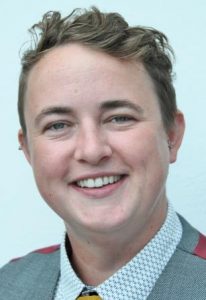As someone who once worked in an Emergency Duty Team, I have incredible respect for those social workers who work through the night providing vital responses and services to children, families and adults.
They work effectively and efficiently alongside colleagues from the police, health and housing services, as well as other key agencies.
The values, knowledge, skills and applied practice that our EDT social workers demonstrate night in and night out, are remarkable and their work often goes unrecognised. I am therefore delighted to host Senior Social Worker and AMHP Sophie Greenchester's guest blog on her reflections and experiences of this vital role

"The sun is shining and it’s a beautiful morning. I’m sitting outside, reading a novel, sipping posh coffee and wondering what to do with my day. Is this a typical social worker’s morning? Probably not. But I missed the sun yesterday and I was sleeping after a busy shift. I am a social worker… just at night!
I work in an out of hours Emergency Duty Team (EDT) in the London Borough of Lewisham. We provide a generic social work service for the 128 hours a week when offices close and daytime colleagues are (hopefully) enjoying some well-earned rest, recuperation and time with their own friends and families.
There are six of us in our team, including our manager. Only one of us is on shift at a time, responding to whatever social work emergency comes our way and calling our manager if we need support or advice.
I start at 5pm with a call to the switchboard services, letting them know I am on shift. Notebook and pen at the ready and computer systems open, I check emails from daytime colleagues. These may include:
- Lists of in-house foster carers available for emergency placements;
- Handovers from daytime AMHP colleagues;
- Child protection concerns;
- Updates on recent foster placements;
- Adult social care alerts.
 The phone rings – it’s the friendly, familiar voice of a switchboard operator. The work begins!
The phone rings – it’s the friendly, familiar voice of a switchboard operator. The work begins!
Over the course of a typical shift we handle a wide range of calls…
We often receive requests for Mental Health Act assessments in settings including A&E, police custody, or designated places of safety – sometimes all at the same time! Current bed pressures mean this could include reassessments of people where Approved Mental Health Professionals (AMHPs) have been minded to make applications for detention in situations where beds are unavailable.
Various care agencies contact us with concerns about clients not answering the door to their carers. We have to assess each situation based on what we’re told, the information available on the adult social care system, and our own investigative skills (calls to family and friends, hospitals, Linkline etc.). We can then make informed judgements as to whether we think it likely individuals have simply popped out, or if concerns for their wellbeing are sufficiently strong to merit ‘safe and well’ checks.
We also receive contacts from the police informing us of children taken into their protection and requiring social work services, including emergency placements if necessary.
Ambulance or hospital services may also call with safeguarding issues about a child’s injuries and we often hear from concerned members of the public too. For example, they may contact us to say they have found an older person who cannot remember their name or where they live, or we might hear from neighbours worried that small children have been left home alone.
On Christmas Day, I received a call from a parent who wanted their teenager “placed in to care.” I could hear the child in the background and asked the parent to find a place where we could talk discreetly.
It became clear that the parent was threatening the child with social services to punish their disrespectful behaviour. I was able to help them understand the inappropriateness of such a threat and identify strategies to improve the dynamic with their child – particularly on Christmas Day!
Some shifts involve these calls happening simultaneously and we have to prioritise responses based on urgency and our duty to liaise with emergency services to help safeguard the vulnerable.
To daytime colleagues: please keep contact details, case notes and summaries up to date and pass on any concerns to your EDT team - we can handle it. That said - if you’re reading this and it’s 5pm, go home, sit back and relax … we’ve got this!
My colleagues and manager are wonderful and our team meetings a much needed time to come together and support each other. There is often much political discussion interspersed with laughter – one side effect of the vicarious trauma we encounter in our line of work. This comradery and mutual respect has helped me to grow and develop as a social worker. I would recommend EDT, but without team support it could be overwhelming for some.
The time between shifts gives us opportunity to rest and recuperate or get involved in other aspects of social work. I am a Best Interest Assessor and teaching consultant and a member of the BASW England Committee …and I do love my posh coffee!
I love my job too. Being a social worker is a big part of my identity – my personal values align well with social work’s and I feel lucky and privileged to have found a job that I enjoy so much. I hope I can continue to work with the same enthusiasm, care, ambition, drive and commitment that I do now."
About Sophie Greenchester
Sophie is a Senior Social Worker and AMHP with the Emergency Duty Team in the London Borough of Lewisham
1 comment
Comment by Social Work Superhero posted on
What a great blog about the after hours work of social workers. I work during the day as a caseworker, but we rotate shifts during the week and weekends so there are days we are out late, and still come to work the next day. Your account of the call on Christmas Day is all too real, as it appears on holidays some parents have a tendency to do this; other days as well.
I work in the US but the experience is much the same. Thank you for sharing this with us! ~Social Work Superhero
http://socialworksuperhero.blog